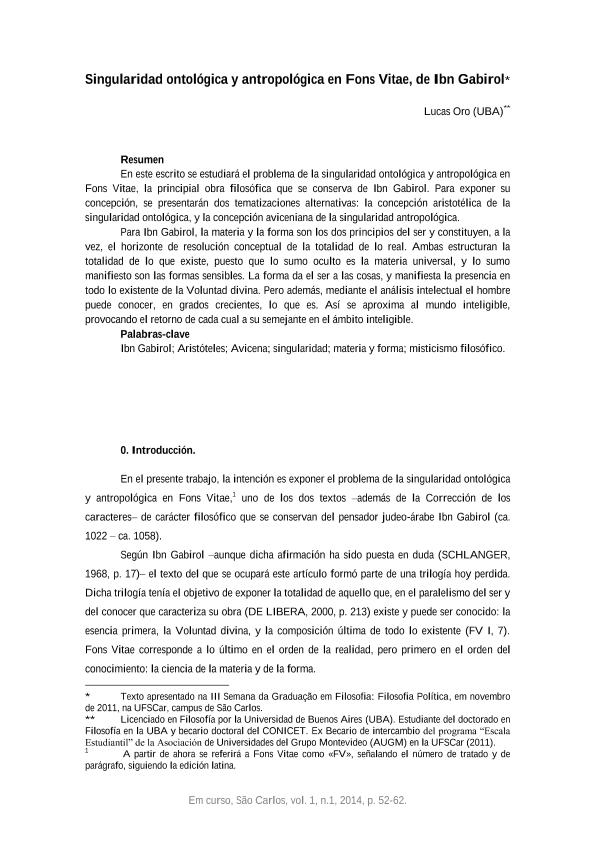Mostrar el registro sencillo del ítem
dc.contributor.author
Oro, Lucas

dc.date.available
2019-02-07T20:17:54Z
dc.date.issued
2014-12
dc.identifier.citation
Oro, Lucas; Singularidad ontológica y antropológica en Fons Vitae, de Ibn Gabirol; Universidade Federal de São Carlos; Em curso; 1; 1; 12-2014; 52-62
dc.identifier.issn
2359-5841
dc.identifier.uri
http://hdl.handle.net/11336/69729
dc.description.abstract
En este escrito se estudiará el problema de la singularidad ontológica y antropológica en Fons Vitae, la principial obra filosófica que se conserva de Ibn Gabirol. Para exponer su concepción, se presentarán dos tematizaciones alternativas: la concepción aristotélica de la singularidad ontológica, y la concepción aviceniana de la singularidad antropológica. Para Ibn Gabirol, la materia y la forma son los dos principios del ser y constituyen, a la vez, el horizonte de resolución conceptual de la totalidad de lo real. Ambas estructuran la totalidad de lo que existe, puesto que lo sumo oculto es la materia universal, y lo sumo manifiesto son las formas sensibles. La forma da el ser a las cosas, y manifiesta la presencia en todo lo existente de la Voluntad divina. Pero además, mediante el análisis intelectual el hombrepuede conocer, en grados crecientes, lo que es. Así se aproxima al mundo inteligible, provocando el retorno de cada cual a su semejante en el ámbito inteligible.
dc.description.abstract
This paper intends to analyze the problem of ontological and anthropological singularity within Fons Vitae by Ibn Gabirol. First, some remarks are made about the Aristotelian conception of ontological singularity and the Avicennian conception of anthropological singularity. That will help to thoroughly grasp Gabirol´s thought on this particular point. According to Ibn Gabirol, matter and form are the principles of being. Both represent the horizon of conceptual resolution of all reality. Both define the totality of what exists, because the most hidden is the universal matter, while the most evident are the sensitive forms. Form gives its being to all existing things. At the same time, it reveals the presence of the Divine Will. Through intellectual analysis, man can know –in increasingly degree– what he is. Thus, he approaches the intelligible world, enacting the return of each one to what it is similar to each one in the intelligible ambit.
dc.format
application/pdf
dc.language.iso
spa
dc.publisher
Universidade Federal de São Carlos

dc.rights
info:eu-repo/semantics/openAccess
dc.rights.uri
https://creativecommons.org/licenses/by-nc-sa/2.5/ar/
dc.subject
Ibn Gabirol
dc.subject
Fons Vitae
dc.subject
Singularidad Ontológica
dc.subject
Singularidad Antropológica
dc.subject
Materia y Forma
dc.subject
Misticismo Filosófico
dc.subject
Avicena
dc.subject
Aristóteles
dc.subject.classification
Estudios Religiosos

dc.subject.classification
Filosofía, Ética y Religión

dc.subject.classification
HUMANIDADES

dc.title
Singularidad ontológica y antropológica en Fons Vitae, de Ibn Gabirol
dc.type
info:eu-repo/semantics/article
dc.type
info:ar-repo/semantics/artículo
dc.type
info:eu-repo/semantics/publishedVersion
dc.date.updated
2019-02-06T17:41:26Z
dc.journal.volume
1
dc.journal.number
1
dc.journal.pagination
52-62
dc.journal.pais
Brasil

dc.journal.ciudad
San Carlos
dc.description.fil
Fil: Oro, Lucas. Consejo Nacional de Investigaciones Científicas y Técnicas; Argentina. Universidad de Buenos Aires. Facultad de Filosofía y Letras; Argentina
dc.journal.title
Em curso
dc.relation.alternativeid
info:eu-repo/semantics/altIdentifier/url/http://www.emcurso.ufscar.br/index.php/emcurso/article/view/5
Archivos asociados
